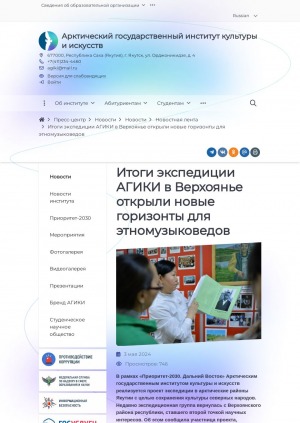Год выпуска: 2024
Год выпуска: 2024
Год выпуска: 2024
Год выпуска: 2024
Год выпуска: 2024
The relevance of this study lies in the changing role of the teacher in modern conditions, in the fact that his/her functions and responsibilities as a teacher must constantly be adapted to the changing requirements of digitalization and globalization. In this regard, teachers need to reassess values and reconsider their attitude towards professional pedagogical activities. In accordance with the modern paradigm of education, a teacher must be mobile, creative, have high creative potential, analytical and communication abilities, he/she must be ready for self-education, self-improvement, must be able to formulate paths for his/her continuous professional development, self-development and self-education. The aim of this study is to analyze and consider the content of the basic concepts of work and professional pedagogical activity of a teacher in the aspect of positive pedagogy. To achieve the goal of the study, we are faced with the task of clarifying and defining the essential characteristics of the professional pedagogical activity of a modern teacher, identifying its component structure in the aspect of positive pedagogy. The study used the method of analyzing psychological and pedagogical literature, aimed at clarifying the essential concepts of "positive pedagogy", "positive attitude", "positive personality", "professional pedagogical activity". The methods of survey, testing, theoretical and empirical analysis were used. To determine the dynamics of the development of the professional and pedagogical activity of teachers, we used the "feedback" method, as well as the method of statistical data processing on a 5-point scale to determine the motivational, personal, cognitive components, which includes formative and the final stages of assessment. The scientific novelty of this study is the presentation of the analytical concept of "formation of professional pedagogical activity of a teacher" in the research of positive pedagogy, determination of its level and components. The theoretical significance of the study lies in clarifying the components of the formation of positive professional pedagogical activity and the levels of their formation. The practical significance of the study is in the analysis and review of the problem of forming the professional pedagogical activity of a teacher in the aspect of positive pedagogy. These conclusions can become the basis for conducting research on this topic. The main results of the study allow us to conclude that considering the problem of forming a teacher’s professional and pedagogical activity from the point of view of positive pedagogy is relevant in modern conditions
Год выпуска: 2024
- Общественные науки. Образование,
- КНИГАКАН > Общественные науки > Народное образование. Воспитание. Обучение. Профессиональное и среднее специальное образование. Высшее обрзование. Организация досуга,
- КНИГАКАН > Общественные науки > Этнография. Обычаи. Жизнь народа. Нравы. Фольклор,
- КНИГАКАН > Все народы > Эвенки (тунгусо-маньчжурская группа языков) > Общественные науки.
Год выпуска: 2024
Год выпуска: 2024
Количество страниц: 4 с.
- Общественные науки. Образование > Народное образование. Воспитание. Обучение. Организация досуга > Общеобразовательная школа. Дошкольные учреждения,
- НАУКА ЯКУТИИ > ОБЩЕСТВЕННЫЕ НАУКИ > Народное образование. Воспитание. Обучение. Организация досуга > Общеобразовательная школа. Дошкольные учреждения,
- КНИГАКАН > Общественные науки > Народное образование. Воспитание. Обучение. Профессиональное и среднее специальное образование. Высшее обрзование. Организация досуга.
The article reveals the content of the project of multicultural ethnoecological education of preschool children, based on the material and spiritual culture of the indigenous peoples living in the Republic of Sakha (Yakutia). The new model of ethnoecological education provides conditions for introducing pupils tothe spiritual values of the indigenous peoples of the Republic of Sakha (Yakutia) accumulated over centuries. The author emphasizes the importance and significance of developing teachers’ skills in conducting research and search work in this direction.
Лебедева, Н. Н. Использование культурного наследия народов Арктики в духовно-нравственном воспитании детей дошкольного возраста / Н.Л. Лебедева ; АОУ РС (Я) ДПО "Институт развития образования и повышения квалификации им. С. Н. Донского-II" // Народное образование Якутии. -2024, N 3 (132). - С. 61-64.
Год выпуска: 2023
Рассмотрена проблема сложности этнической самоидентификации современного человека. Предложен анализ корпуса базовых символов, функционирующих как в обряде, так и в повседневности. Определена специфика структурирования и иерархизации смыслового поля культуры, где символы фигурируют в качестве знаков идентификации этноса и генетической памяти культуры. Отмечено, что в традиционной повседневности обыденное сознание использует эти символы как нечто "само собой разумеющееся", не подлежащее рефлексии, автоматически выстраивающее бытовой контекст: "я- концепция" этноса, самоназвание, повседневное знание, совместно известное представление о родной земле – алаас. Исходя из аналогий между обыденным и мифологическим сознанием, автор на примере самоназвания и пространственных представлений в культуре саха (якутов) рассматривает структуру и механизм функционирования ключевых символов. Автор утверждает, что символы служат основанием этнической идентификации, актуализируют и укрепляют в сознании носителя культуры духовный опыт предшественников, тем самым укореняют человека и обеспечивают основания его бытия









